【培优讲义】第1讲 英语牛津深圳版 七年级下册 Unit 1 People around us (1)
文档属性
| 名称 | 【培优讲义】第1讲 英语牛津深圳版 七年级下册 Unit 1 People around us (1) |
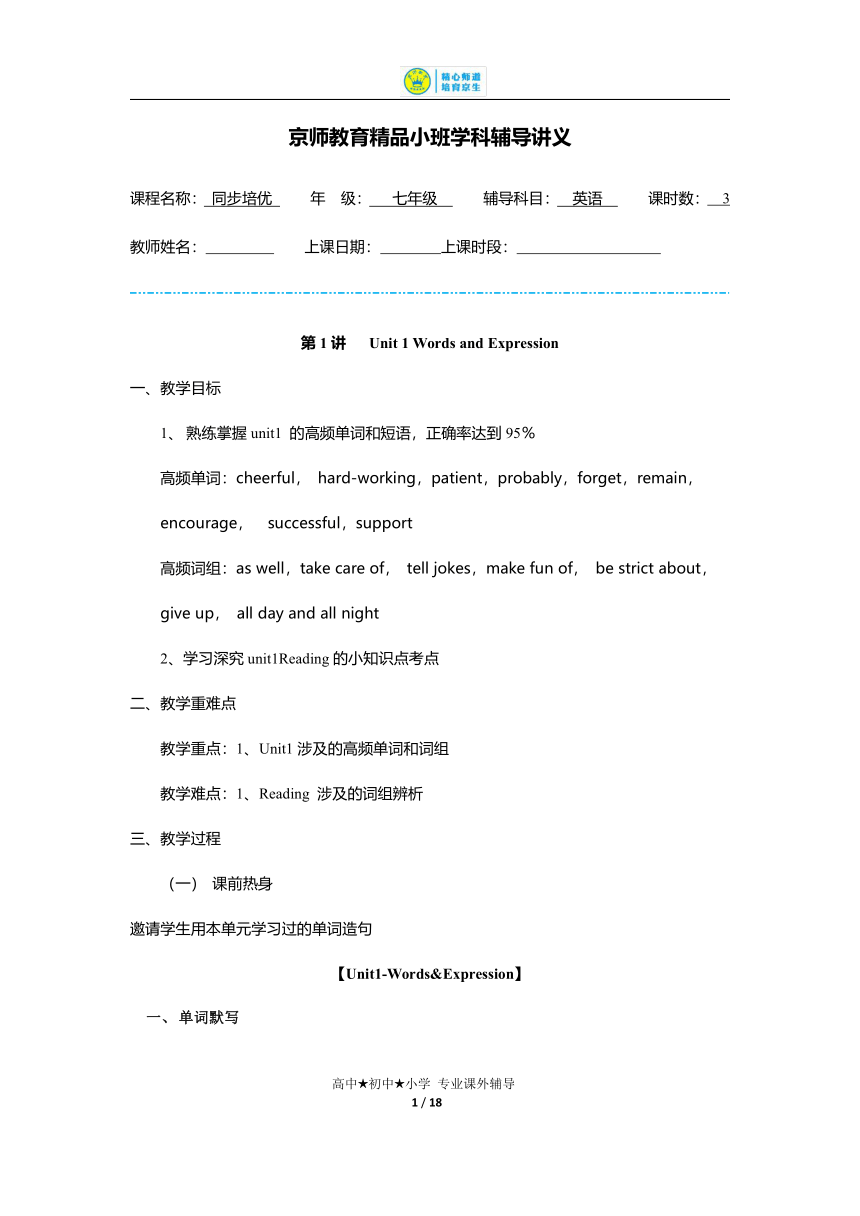
|
|
| 格式 | docx | ||
| 文件大小 | 43.1KB | ||
| 资源类型 | 试卷 | ||
| 版本资源 | 牛津深圳版 | ||
| 科目 | 英语 | ||
| 更新时间 | 2022-01-20 00:00:00 | ||
图片预览

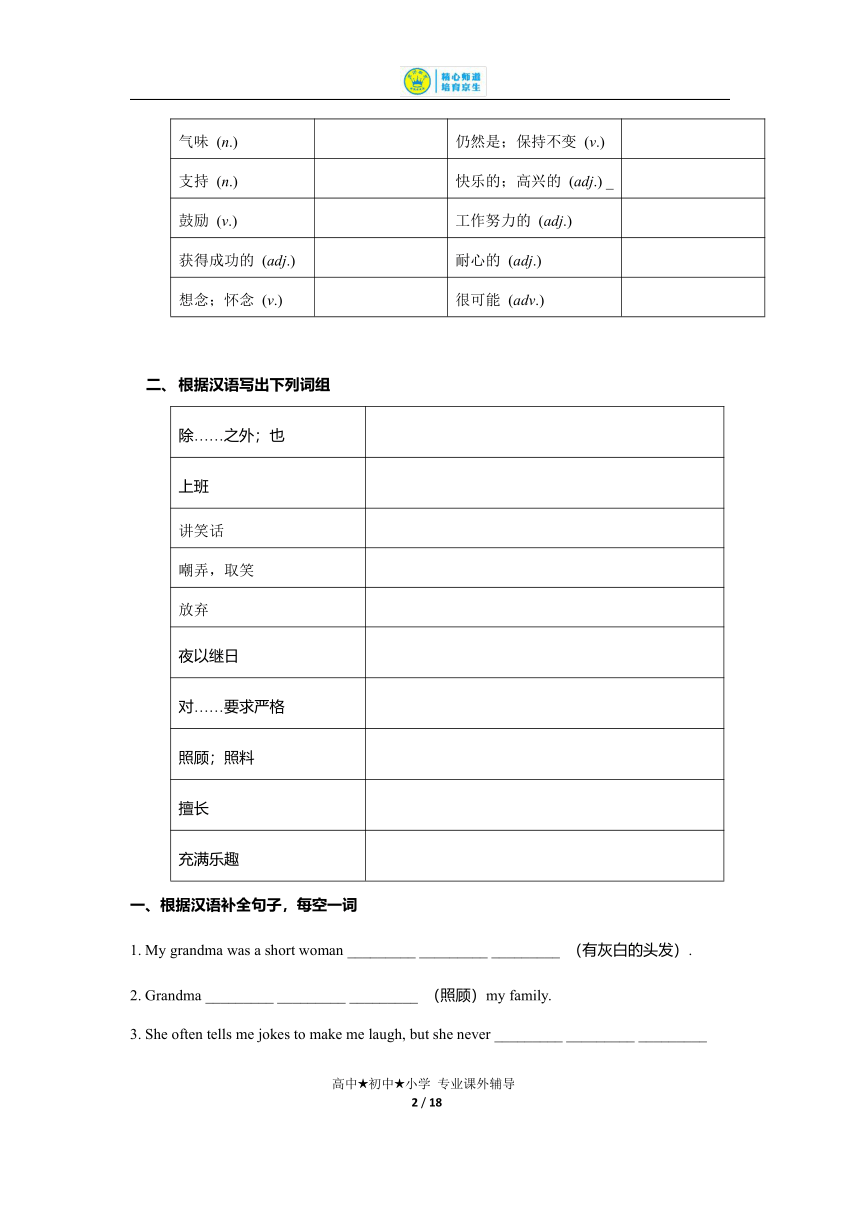
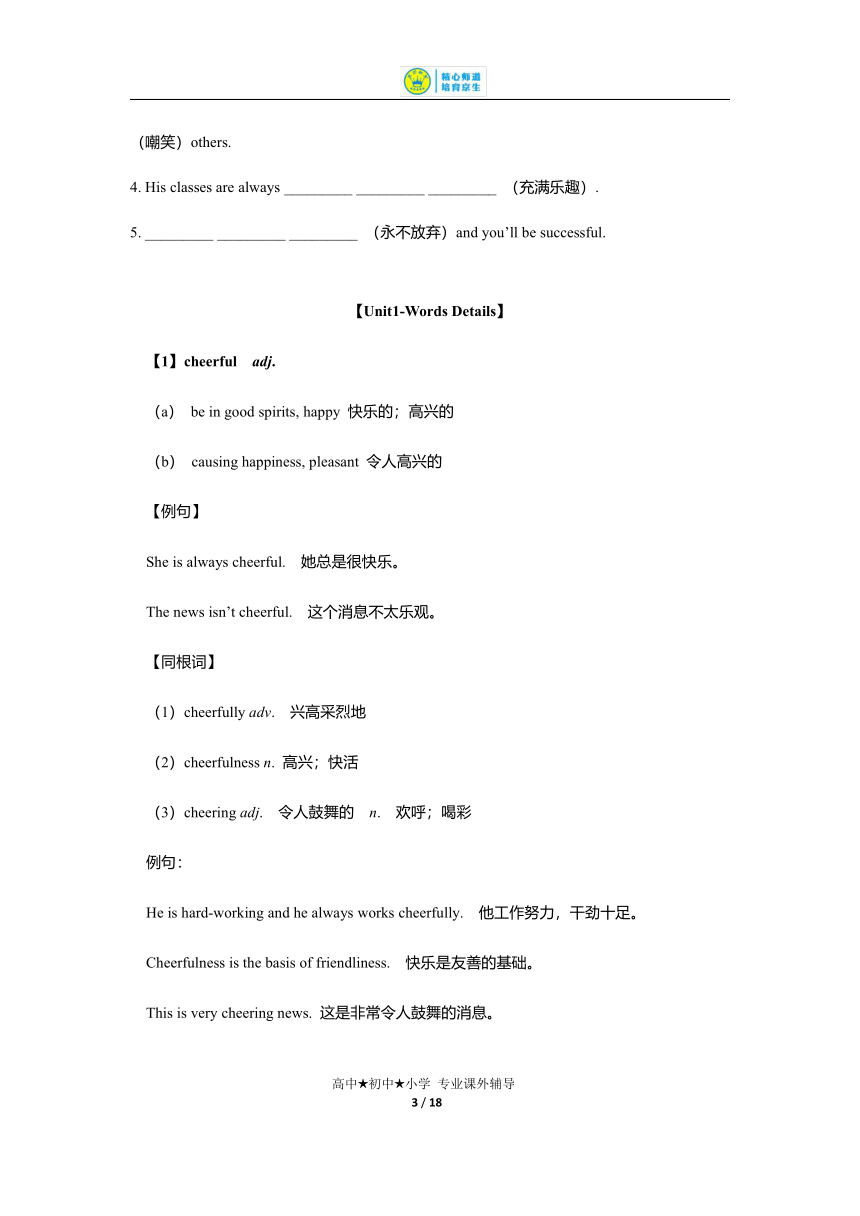
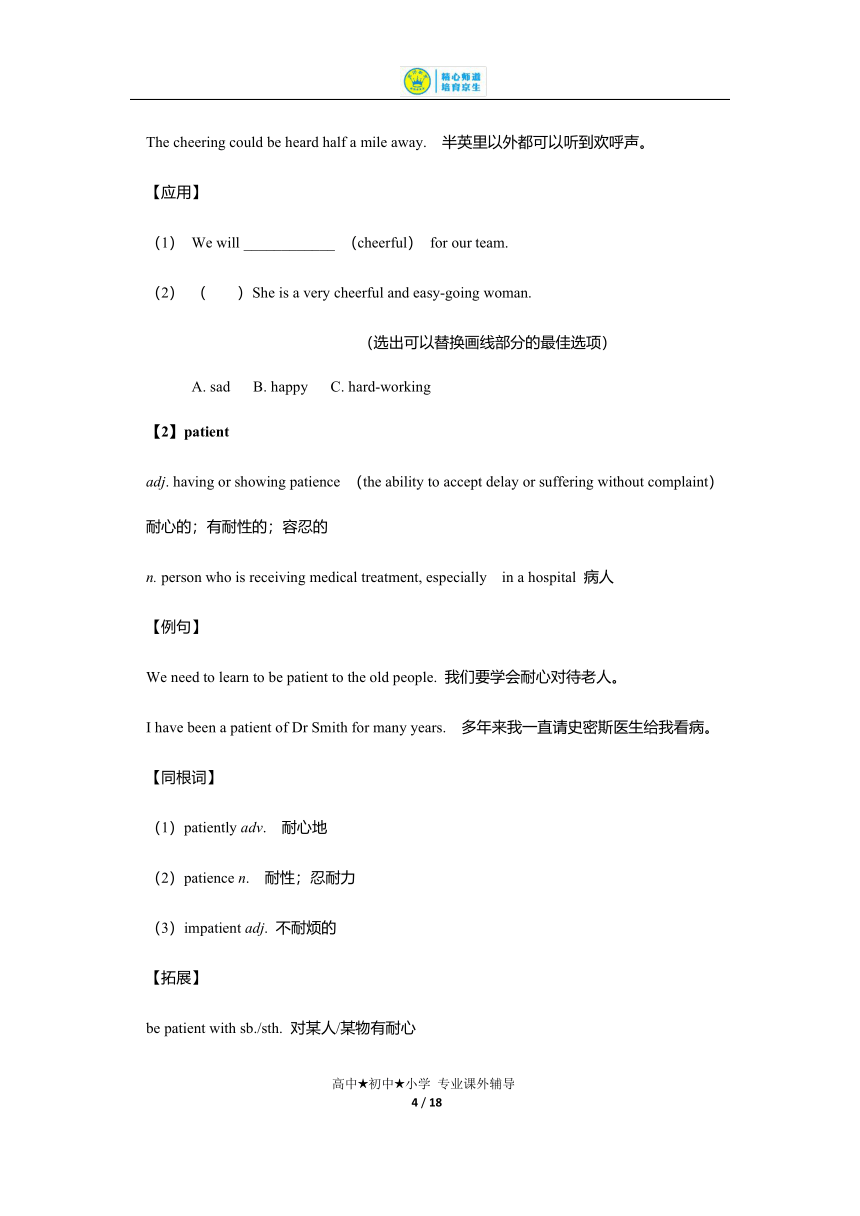
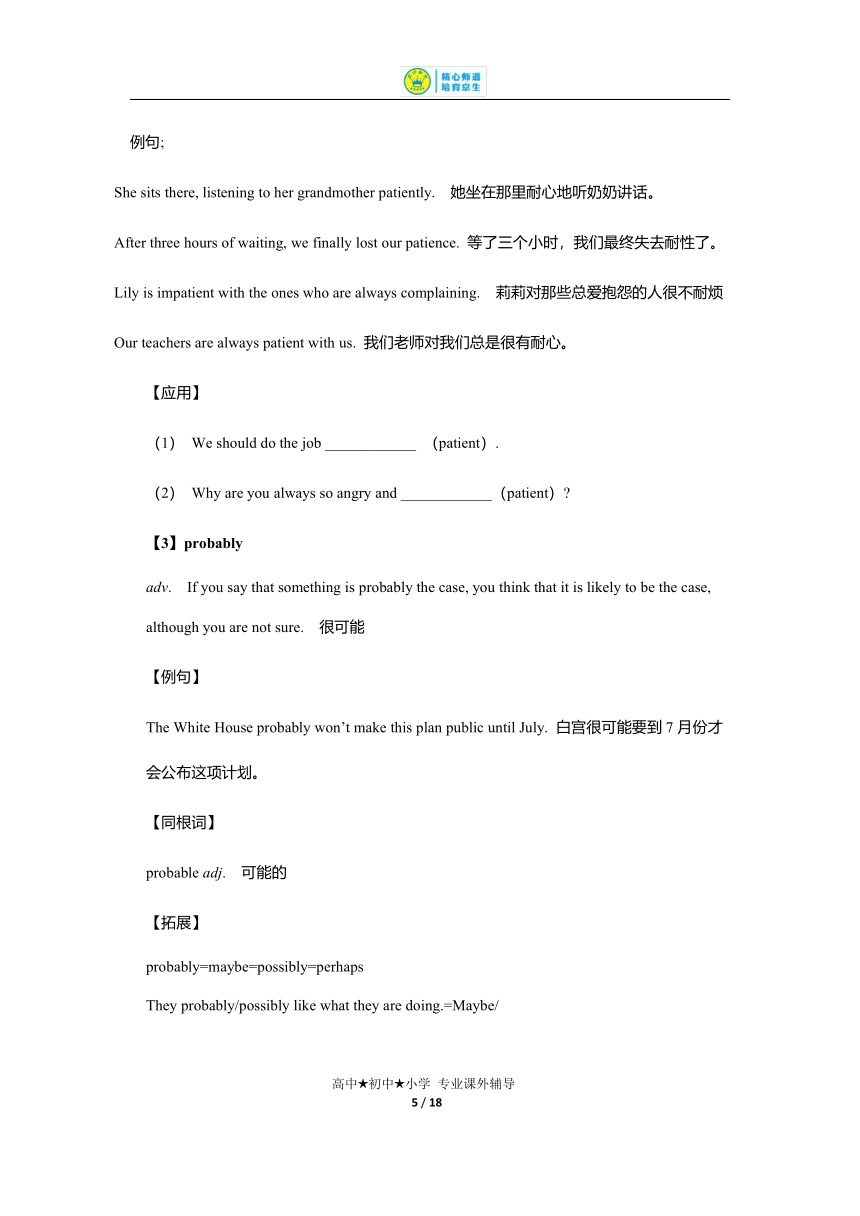
文档简介
京师教育精品小班学科辅导讲义
课程名称: 同步培优 年 级: 七年级 辅导科目: 英语 课时数: 3
教师姓名: 上课日期: 上课时段:
第1讲 Unit 1 Words and Expression
教学目标
熟练掌握unit1 的高频单词和短语,正确率达到95%
高频单词:cheerful, hard-working,patient,probably,forget,remain,
encourage, successful,support
高频词组:as well,take care of, tell jokes,make fun of, be strict about,
give up, all day and all night
2、学习深究unit1Reading的小知识点考点
教学重难点
教学重点:1、Unit1涉及的高频单词和词组
教学难点:1、Reading 涉及的词组辨析
教学过程
课前热身
邀请学生用本单元学习过的单词造句
【Unit1-Words&Expression】
单词默写
气味 (n.) 仍然是;保持不变 (v.)
支持 (n.) 快乐的;高兴的 (adj.) _
鼓励 (v.) 工作努力的 (adj.)
获得成功的 (adj.) 耐心的 (adj.)
想念;怀念 (v.) 很可能 (adv.)
根据汉语写出下列词组
除……之外;也
上班
讲笑话
嘲弄,取笑
放弃
夜以继日
对……要求严格
照顾;照料
擅长
充满乐趣
一、根据汉语补全句子,每空一词
1. My grandma was a short woman _________ _________ _________ (有灰白的头发).
2. Grandma _________ _________ _________ (照顾)my family.
3. She often tells me jokes to make me laugh, but she never _________ _________ _________ (嘲笑)others.
4. His classes are always _________ _________ _________ (充满乐趣).
5. _________ _________ _________ (永不放弃)and you’ll be successful.
【Unit1-Words Details】
【1】cheerful adj.
(a) be in good spirits, happy 快乐的;高兴的
(b) causing happiness, pleasant 令人高兴的
【例句】
She is always cheerful. 她总是很快乐。
The news isn’t cheerful. 这个消息不太乐观。
【同根词】
(1)cheerfully adv. 兴高采烈地
(2)cheerfulness n. 高兴;快活
(3)cheering adj. 令人鼓舞的 n. 欢呼;喝彩
例句:
He is hard-working and he always works cheerfully. 他工作努力,干劲十足。
Cheerfulness is the basis of friendliness. 快乐是友善的基础。
This is very cheering news. 这是非常令人鼓舞的消息。
The cheering could be heard half a mile away. 半英里以外都可以听到欢呼声。
【应用】
(1) We will ____________ (cheerful) for our team.
(2) ( )She is a very cheerful and easy-going woman.
(选出可以替换画线部分的最佳选项)
A. sad B. happy C. hard-working
【2】patient
adj. having or showing patience (the ability to accept delay or suffering without complaint) 耐心的;有耐性的;容忍的
n. person who is receiving medical treatment, especially in a hospital 病人
【例句】
We need to learn to be patient to the old people. 我们要学会耐心对待老人。
I have been a patient of Dr Smith for many years. 多年来我一直请史密斯医生给我看病。
【同根词】
(1)patiently adv. 耐心地
(2)patience n. 耐性;忍耐力
(3)impatient adj. 不耐烦的
【拓展】
be patient with sb./sth. 对某人/某物有耐心
例句;
She sits there, listening to her grandmother patiently. 她坐在那里耐心地听奶奶讲话。
After three hours of waiting, we finally lost our patience. 等了三个小时,我们最终失去耐性了。
Lily is impatient with the ones who are always complaining. 莉莉对那些总爱抱怨的人很不耐烦
Our teachers are always patient with us. 我们老师对我们总是很有耐心。
【应用】
(1) We should do the job ____________ (patient).
(2) Why are you always so angry and ____________(patient)
【3】probably
adv. If you say that something is probably the case, you think that it is likely to be the case, although you are not sure. 很可能
【例句】
The White House probably won’t make this plan public until July. 白宫很可能要到7月份才会公布这项计划。
【同根词】
probable adj. 可能的
【拓展】
probably=maybe=possibly=perhaps
They probably/possibly like what they are doing.=Maybe/
例句:
It is probable that we can’t finish the work on time. 很可能我们不能按时完成这项工作。
Perhaps they like what they are doing. 他们很可能喜欢他们正在做的事。
【应用】
(1) It is highly ____________ (probably) that the problem is far bigger.
(2) ( )But, you probably still have dreams!(选出可以替换画线部分的最佳选项)
A. possible B. may be C. maybe
【4】forget
v. cannot think of sb./sth. or think how to do sth., although you knew it or knew how to do it in the past 忘了 (某人、某事物或如何做某事)
【例句】
I will never forget your kindness. 我永远不会忘记你的好。
【同根词】
(1)forgetful adj. 健忘的
(2)unforgettable adj. 难忘的
I spent an unforgettable time in middle school. 我在中学度过了一段难忘的时光。
She is a forgetful girl. 她是个健忘的女孩。
【拓展】
(1)forget=not remember
(2)forget to do 忘记去做
(3)forget doing 忘记做过
I forget what you said. =I don’t remember what you said. 我忘记你说了什么。
I forget to do my homework. 我忘记做作业了。
I forget doing my homework. 我忘记我做完作业了。
【应用】
(1) ( )I will not forget that.(选出可以替换画线部分的最佳选项)
A. do B. support C. remember
(2) The school life was colourful. It left me a lot of ________________ (forget) things.
(3) The door is open. Don’t forget ____________ (lock) it.
(4) The door is closed. I forgot ________________ (lock) it.
【5】smell
n. The smell of something is a quality it has which you become aware of when you breathe in through your nose. 气味
v. If you smell something, you become aware of it when you breathe in through your nose. 闻到
v.-link If something smells a particular way, it has a quality which you become aware of through your nose. 有……的气味;闻起来
【例句】
I smell a smell of freshly baked bread. 我闻到一股新烤面包的气味。
It smells delicious. 它闻起来真香。
【拓展】
smell作动词意为“闻起来”时,和look, sound, taste, feel等词相同,均是常见的连系动词,后面通常接形容词作表语。
The idea sounds good. 这个主意听起来不错。
【应用】
(1)It has a ________________ (smell) of perfume(香水).
(2)( )The perfume ________ very sweet.
A. is smelt B. smells C. taste
【6】care
n. & v. If you care about something, you feel that it is important and are concerned about it. 照顾;照料;在乎
【例句】
The plants grow well under our care.在我们的照料下,这些植物茁壮生长。
Why do I care 为什么我要关心?
【同根词】
(1)careful adj. 细心的
(2)careless adj. 粗心的
We have to be careful. 我们不得不小心。
A careless driver is a danger to the public. 粗心的司机对于公众是一种危险。
【拓展】
take care of=look after 照料;照顾
You should take care of yourself. 你应该照顾好自己。
【应用】
(1)If we are ________________ (care) enough, we won’t make mistakes.
(2) ( )My father works hard and takes care of our family well.(选出可以替换画线部分的最佳选项)
A. looks after B. looks at C. looks for
【7】remain
v. If someone or something remains in a particular state or condition, they stay in that state or condition and do not change. 仍然是;保持不变
【例句】
The three men remained silent. 这三个男人保持沉默。
【应用】
( )Let things remain as they have been in the past.(选出可以替换画线部分的最佳选项)
A. become B. like C. be still
【8】support
n. & v. If you support someone or their ideas or aims, you agree with them, and perhaps help them because you want them to succeed. 支持
【例句】
The vice president insisted that he supported the hard-working people. 副总统坚持认为他支持勤劳的人民。
【同根词】
(1) supportive adj. 支持的
(2)supporter n. 支持者;拥护者
They were always asupportive of each other. 他们总是互相支持。
I am a supporter of Chinese women volleyball team. 我是中国女排队的支持者。
【拓展】
(1)give support to 支持;支援
(2)in support of 支持;拥护
We should give support to poor children. 我们应该给贫困孩子提供帮助。
They decided to stay in support of the new leadership. 为了支持新的领导班子,他们决定留下来。
【应用】
I want to be a __________ (support) by your side.
【9】successful
adj. Something that is successful achieves what it was intended to achieve./Someone who is successful achieves what he/she intended to achieve. 获得成功的;有成效的
【例句】
I am looking forward to a long and successful partnership with him. 我期待着与他的长期而有成效的合作关系。
【同根词】
(1) success n. 成功;胜利
(2) succeed v. 成功
(3) successfully adv. 成功地
We all believed that work was the key to success. 我们都曾经相信工作是成功的关键。
We have already succeeded in working out ground rules. 我们已经顺利地制定了基本原则。
We successfully drove back to the centre of the city overing the jam quarter. 我们顺利地穿过拥挤的居民区,开车回到了市中心。
【拓展】
succeed in doing sth.=do sth. successfully成功地做了某事
It should run successfully this time. 这次命令应当运行成功。
【应用】
(1)All of us want to ____________ (successful) in life.
(2)Working hard is the key to _________ (successful).
Reading Points
【1】My grandma was a short woman with grey hair. 我祖母个头不高,且满头银发。
【用法】
with prep. 意为“带着;具有;加上;包括……在内;和……一起”。
with+短语表示一种伴随情况。
【例句】
The girl with long hair is my sister. 长发女孩是我姐姐。
This is an apartment with two bedrooms. 这个公寓有两间卧室。
【拓展】
without 是with 的反义词,表示“没有;毫无;不”。
【2】Grandma took care of my family. 祖母照顾着我全家。
【用法】take care of=look after 照顾;照料
【例句】
It is our responsibility to take care of the old. 照顾老人是我们的职责。
【拓展】
take good care of=look after...well 好好照顾
【应用】
Could you please ____________ __________ (照顾) of my dog while I am away
【3】She often tells me jokes to make me laugh, but she never makes fun of others. 她经常讲笑话使我大笑,可她从来不取笑别人。
【用法】
tell jokes/tell a joke 讲笑话
make sb. do sth. 让某人做某事
make fun of 取笑
【例句】
My teacher likes telling jokes, which makes his class very interesting. 我的老师喜欢讲笑话,这使得他的课堂总是很有趣。
He made his brother cry again. 他又把他的弟弟弄哭了。
It is not polite to make fun of others. 嘲笑别人是不礼貌的。
【拓展】
(1)play a joke on 戏弄某人;开某人的玩笑
(2)play tricks on sb. 捉弄某人
(3)make sb./sth.+adj. 使得某人或某事……
She is naughty and she often makes her grandma angry. 她很调皮总是惹她奶奶生气。
We should try to make our classroom clean. 我们应该努力使我们的教室干净。
(4)let sb. do sth. 让某人做某事
allow sb. to do sth. 允许某人做某事
【应用】
(1)Let me ________________ (go) to the supermarket with you, will you
(2)Our teacher sometimes allows us ________________ (do) do our homework at school.
(3)Lily often makes Lucy ________________ (clean) the room for her.
【4】His classes are always full of fun. 他的课堂总是充满着乐趣。
【用法】
be full of=be filled with 充满
【例句】
The bottle is full of water.=The bottle is filled with water. 这个瓶子装满了水。
【应用】
The meeting room is full ________________ happiness.
【5】Mr Li is strict about our studies, but he always encourages us and gives us support. 李老师对我们的学习要求严格,但他总是鼓励并支持我们。
【用法】
be strict about/in sth. 对某事要求严格
encourage sb. (to do sth./not to do sth.) 鼓励某人(做某事/不做某事)
【例句】
Every factory should be strict about/in the quality of their products. 每家工厂都该严把产品质量关。
The teacher often encourages us to study hard. 老师经常鼓励我们努力学习。
【拓展】
be strict with sb. 对某人要求严格
【应用】
(1)The Maths teacher is always strict ______________ his students.
(2)( )I think Maths is too hard for me, but he encourages me _______ give it up.
A. to B. not to C. don’t
【6】Never give up and you’ll be successful. 永不放弃你就会成功。
【用法】
(1)give up 放弃
give up (doing) sth. 放弃(做)某事
(2)successful adj. 获得成功的
be successful in (doing) sth. (做)某事很成功
【例句】
She gave up her job to look after her sick baby at home. 她放弃工作在家照顾她生病的孩子。
【应用】
(1)( )Finally he decided to ________ smoking because it was really bad for his health.
A. pick upq B. keep on C. give up
(2)Bill Gates is a ________________ (succeed) businessman.
课后作业
一、根据句意及首字母提示完成单词
1. My grandma is the p__________ I love.
2. He always gives me s__________ when I am in trouble.
3. My mother is s__________ about my study.
4. I m__________ my grandma very much.
5. I will not f__________ to do my job.
6. The s__________ comes from the kitchen.
7. She is h______________, so she studies well.
8. This book is p__________ the most interesting one.
9. Mary is always c__________. She seems to have nothing to worry about.
10. Our teacher n________ makes fun of us. We all love her.
二、用所给单词的适当形式填空
1. Tom is very ________ (care) and he seldom makes mistakes.
2. If you are ________ (patient), you can’t do it well.
3. This is the secret of________(successful).
4. Thanks for your ______________ (encourage). I will keep trying.
5. My pen is ________ (miss). I can’t find it.
6. John couldn’t make the computer ________(work) again.
7. Jane is my good friend and she is good at ________(sing).
8. It kept ________(rain) for a week in my city.
9. It takes her little time ________(read) books at home.
10. Peter likes __________________(collect) coins in his free time.
三、根据教材课本P3的课文内容,补全下面短文,每空一词
My grandma was a short woman with 1. ___________ hair. She was always 2. __________ and good at cooking. I will never forget the 3. __________ of her dishes, and the
4. ________ as well.
Alice is my best friend. She often tells me 5. ________ to make me laugh, but she never makes 6. ________ of others. I hope we will always 7. __________ friends.
Mr Li is my Maths teacher. He is 8. __________ about our studies. He often 9. _______________ us and says, “Never give up and you’ll be 10. ____________.”
四、阅读理解
Mr White was over 80 years old, but he looked younger than his age. He played tai chi in the park every day, so he was very healthy. It was 11:30. It was time for him to walk home. He usually got home thirty minutes later. One day, Mr White didn’t get home until 12:30. His family worried about him. After a short while, a police car stopped in front of their house. What happened “The old man was lost and he called us for help,” the policeman said.
When the policeman left, Mr White’s daughter asked her father, “Dad, you go to the park every day. How can you be lost ” “I’m not lost at all. I’m just tired. I don’t want to go home on foot,” answered Mr White with a smile.
( )1. Mr White went to the park to ________.
A. walk B. play tai chi C. run D. call the police
( )2. Mr White usually got home at ________.
A. 11:00 B. 11:30 C. 12:00 D. 12:30
( )3. Mr White went to the park ________.
A. every day B. once a week C. on weekends D. on Sundays
( )4. Which of the following is NOT true
A. Mr White was very healthy.
B. Mr White usually walked home.
C. Mr White was lost when he was on his way home.
D. The policeman sent Mr White back home.
高中★初中★小学 专业课外辅导
2 / 18
课程名称: 同步培优 年 级: 七年级 辅导科目: 英语 课时数: 3
教师姓名: 上课日期: 上课时段:
第1讲 Unit 1 Words and Expression
教学目标
熟练掌握unit1 的高频单词和短语,正确率达到95%
高频单词:cheerful, hard-working,patient,probably,forget,remain,
encourage, successful,support
高频词组:as well,take care of, tell jokes,make fun of, be strict about,
give up, all day and all night
2、学习深究unit1Reading的小知识点考点
教学重难点
教学重点:1、Unit1涉及的高频单词和词组
教学难点:1、Reading 涉及的词组辨析
教学过程
课前热身
邀请学生用本单元学习过的单词造句
【Unit1-Words&Expression】
单词默写
气味 (n.) 仍然是;保持不变 (v.)
支持 (n.) 快乐的;高兴的 (adj.) _
鼓励 (v.) 工作努力的 (adj.)
获得成功的 (adj.) 耐心的 (adj.)
想念;怀念 (v.) 很可能 (adv.)
根据汉语写出下列词组
除……之外;也
上班
讲笑话
嘲弄,取笑
放弃
夜以继日
对……要求严格
照顾;照料
擅长
充满乐趣
一、根据汉语补全句子,每空一词
1. My grandma was a short woman _________ _________ _________ (有灰白的头发).
2. Grandma _________ _________ _________ (照顾)my family.
3. She often tells me jokes to make me laugh, but she never _________ _________ _________ (嘲笑)others.
4. His classes are always _________ _________ _________ (充满乐趣).
5. _________ _________ _________ (永不放弃)and you’ll be successful.
【Unit1-Words Details】
【1】cheerful adj.
(a) be in good spirits, happy 快乐的;高兴的
(b) causing happiness, pleasant 令人高兴的
【例句】
She is always cheerful. 她总是很快乐。
The news isn’t cheerful. 这个消息不太乐观。
【同根词】
(1)cheerfully adv. 兴高采烈地
(2)cheerfulness n. 高兴;快活
(3)cheering adj. 令人鼓舞的 n. 欢呼;喝彩
例句:
He is hard-working and he always works cheerfully. 他工作努力,干劲十足。
Cheerfulness is the basis of friendliness. 快乐是友善的基础。
This is very cheering news. 这是非常令人鼓舞的消息。
The cheering could be heard half a mile away. 半英里以外都可以听到欢呼声。
【应用】
(1) We will ____________ (cheerful) for our team.
(2) ( )She is a very cheerful and easy-going woman.
(选出可以替换画线部分的最佳选项)
A. sad B. happy C. hard-working
【2】patient
adj. having or showing patience (the ability to accept delay or suffering without complaint) 耐心的;有耐性的;容忍的
n. person who is receiving medical treatment, especially in a hospital 病人
【例句】
We need to learn to be patient to the old people. 我们要学会耐心对待老人。
I have been a patient of Dr Smith for many years. 多年来我一直请史密斯医生给我看病。
【同根词】
(1)patiently adv. 耐心地
(2)patience n. 耐性;忍耐力
(3)impatient adj. 不耐烦的
【拓展】
be patient with sb./sth. 对某人/某物有耐心
例句;
She sits there, listening to her grandmother patiently. 她坐在那里耐心地听奶奶讲话。
After three hours of waiting, we finally lost our patience. 等了三个小时,我们最终失去耐性了。
Lily is impatient with the ones who are always complaining. 莉莉对那些总爱抱怨的人很不耐烦
Our teachers are always patient with us. 我们老师对我们总是很有耐心。
【应用】
(1) We should do the job ____________ (patient).
(2) Why are you always so angry and ____________(patient)
【3】probably
adv. If you say that something is probably the case, you think that it is likely to be the case, although you are not sure. 很可能
【例句】
The White House probably won’t make this plan public until July. 白宫很可能要到7月份才会公布这项计划。
【同根词】
probable adj. 可能的
【拓展】
probably=maybe=possibly=perhaps
They probably/possibly like what they are doing.=Maybe/
例句:
It is probable that we can’t finish the work on time. 很可能我们不能按时完成这项工作。
Perhaps they like what they are doing. 他们很可能喜欢他们正在做的事。
【应用】
(1) It is highly ____________ (probably) that the problem is far bigger.
(2) ( )But, you probably still have dreams!(选出可以替换画线部分的最佳选项)
A. possible B. may be C. maybe
【4】forget
v. cannot think of sb./sth. or think how to do sth., although you knew it or knew how to do it in the past 忘了 (某人、某事物或如何做某事)
【例句】
I will never forget your kindness. 我永远不会忘记你的好。
【同根词】
(1)forgetful adj. 健忘的
(2)unforgettable adj. 难忘的
I spent an unforgettable time in middle school. 我在中学度过了一段难忘的时光。
She is a forgetful girl. 她是个健忘的女孩。
【拓展】
(1)forget=not remember
(2)forget to do 忘记去做
(3)forget doing 忘记做过
I forget what you said. =I don’t remember what you said. 我忘记你说了什么。
I forget to do my homework. 我忘记做作业了。
I forget doing my homework. 我忘记我做完作业了。
【应用】
(1) ( )I will not forget that.(选出可以替换画线部分的最佳选项)
A. do B. support C. remember
(2) The school life was colourful. It left me a lot of ________________ (forget) things.
(3) The door is open. Don’t forget ____________ (lock) it.
(4) The door is closed. I forgot ________________ (lock) it.
【5】smell
n. The smell of something is a quality it has which you become aware of when you breathe in through your nose. 气味
v. If you smell something, you become aware of it when you breathe in through your nose. 闻到
v.-link If something smells a particular way, it has a quality which you become aware of through your nose. 有……的气味;闻起来
【例句】
I smell a smell of freshly baked bread. 我闻到一股新烤面包的气味。
It smells delicious. 它闻起来真香。
【拓展】
smell作动词意为“闻起来”时,和look, sound, taste, feel等词相同,均是常见的连系动词,后面通常接形容词作表语。
The idea sounds good. 这个主意听起来不错。
【应用】
(1)It has a ________________ (smell) of perfume(香水).
(2)( )The perfume ________ very sweet.
A. is smelt B. smells C. taste
【6】care
n. & v. If you care about something, you feel that it is important and are concerned about it. 照顾;照料;在乎
【例句】
The plants grow well under our care.在我们的照料下,这些植物茁壮生长。
Why do I care 为什么我要关心?
【同根词】
(1)careful adj. 细心的
(2)careless adj. 粗心的
We have to be careful. 我们不得不小心。
A careless driver is a danger to the public. 粗心的司机对于公众是一种危险。
【拓展】
take care of=look after 照料;照顾
You should take care of yourself. 你应该照顾好自己。
【应用】
(1)If we are ________________ (care) enough, we won’t make mistakes.
(2) ( )My father works hard and takes care of our family well.(选出可以替换画线部分的最佳选项)
A. looks after B. looks at C. looks for
【7】remain
v. If someone or something remains in a particular state or condition, they stay in that state or condition and do not change. 仍然是;保持不变
【例句】
The three men remained silent. 这三个男人保持沉默。
【应用】
( )Let things remain as they have been in the past.(选出可以替换画线部分的最佳选项)
A. become B. like C. be still
【8】support
n. & v. If you support someone or their ideas or aims, you agree with them, and perhaps help them because you want them to succeed. 支持
【例句】
The vice president insisted that he supported the hard-working people. 副总统坚持认为他支持勤劳的人民。
【同根词】
(1) supportive adj. 支持的
(2)supporter n. 支持者;拥护者
They were always asupportive of each other. 他们总是互相支持。
I am a supporter of Chinese women volleyball team. 我是中国女排队的支持者。
【拓展】
(1)give support to 支持;支援
(2)in support of 支持;拥护
We should give support to poor children. 我们应该给贫困孩子提供帮助。
They decided to stay in support of the new leadership. 为了支持新的领导班子,他们决定留下来。
【应用】
I want to be a __________ (support) by your side.
【9】successful
adj. Something that is successful achieves what it was intended to achieve./Someone who is successful achieves what he/she intended to achieve. 获得成功的;有成效的
【例句】
I am looking forward to a long and successful partnership with him. 我期待着与他的长期而有成效的合作关系。
【同根词】
(1) success n. 成功;胜利
(2) succeed v. 成功
(3) successfully adv. 成功地
We all believed that work was the key to success. 我们都曾经相信工作是成功的关键。
We have already succeeded in working out ground rules. 我们已经顺利地制定了基本原则。
We successfully drove back to the centre of the city overing the jam quarter. 我们顺利地穿过拥挤的居民区,开车回到了市中心。
【拓展】
succeed in doing sth.=do sth. successfully成功地做了某事
It should run successfully this time. 这次命令应当运行成功。
【应用】
(1)All of us want to ____________ (successful) in life.
(2)Working hard is the key to _________ (successful).
Reading Points
【1】My grandma was a short woman with grey hair. 我祖母个头不高,且满头银发。
【用法】
with prep. 意为“带着;具有;加上;包括……在内;和……一起”。
with+短语表示一种伴随情况。
【例句】
The girl with long hair is my sister. 长发女孩是我姐姐。
This is an apartment with two bedrooms. 这个公寓有两间卧室。
【拓展】
without 是with 的反义词,表示“没有;毫无;不”。
【2】Grandma took care of my family. 祖母照顾着我全家。
【用法】take care of=look after 照顾;照料
【例句】
It is our responsibility to take care of the old. 照顾老人是我们的职责。
【拓展】
take good care of=look after...well 好好照顾
【应用】
Could you please ____________ __________ (照顾) of my dog while I am away
【3】She often tells me jokes to make me laugh, but she never makes fun of others. 她经常讲笑话使我大笑,可她从来不取笑别人。
【用法】
tell jokes/tell a joke 讲笑话
make sb. do sth. 让某人做某事
make fun of 取笑
【例句】
My teacher likes telling jokes, which makes his class very interesting. 我的老师喜欢讲笑话,这使得他的课堂总是很有趣。
He made his brother cry again. 他又把他的弟弟弄哭了。
It is not polite to make fun of others. 嘲笑别人是不礼貌的。
【拓展】
(1)play a joke on 戏弄某人;开某人的玩笑
(2)play tricks on sb. 捉弄某人
(3)make sb./sth.+adj. 使得某人或某事……
She is naughty and she often makes her grandma angry. 她很调皮总是惹她奶奶生气。
We should try to make our classroom clean. 我们应该努力使我们的教室干净。
(4)let sb. do sth. 让某人做某事
allow sb. to do sth. 允许某人做某事
【应用】
(1)Let me ________________ (go) to the supermarket with you, will you
(2)Our teacher sometimes allows us ________________ (do) do our homework at school.
(3)Lily often makes Lucy ________________ (clean) the room for her.
【4】His classes are always full of fun. 他的课堂总是充满着乐趣。
【用法】
be full of=be filled with 充满
【例句】
The bottle is full of water.=The bottle is filled with water. 这个瓶子装满了水。
【应用】
The meeting room is full ________________ happiness.
【5】Mr Li is strict about our studies, but he always encourages us and gives us support. 李老师对我们的学习要求严格,但他总是鼓励并支持我们。
【用法】
be strict about/in sth. 对某事要求严格
encourage sb. (to do sth./not to do sth.) 鼓励某人(做某事/不做某事)
【例句】
Every factory should be strict about/in the quality of their products. 每家工厂都该严把产品质量关。
The teacher often encourages us to study hard. 老师经常鼓励我们努力学习。
【拓展】
be strict with sb. 对某人要求严格
【应用】
(1)The Maths teacher is always strict ______________ his students.
(2)( )I think Maths is too hard for me, but he encourages me _______ give it up.
A. to B. not to C. don’t
【6】Never give up and you’ll be successful. 永不放弃你就会成功。
【用法】
(1)give up 放弃
give up (doing) sth. 放弃(做)某事
(2)successful adj. 获得成功的
be successful in (doing) sth. (做)某事很成功
【例句】
She gave up her job to look after her sick baby at home. 她放弃工作在家照顾她生病的孩子。
【应用】
(1)( )Finally he decided to ________ smoking because it was really bad for his health.
A. pick upq B. keep on C. give up
(2)Bill Gates is a ________________ (succeed) businessman.
课后作业
一、根据句意及首字母提示完成单词
1. My grandma is the p__________ I love.
2. He always gives me s__________ when I am in trouble.
3. My mother is s__________ about my study.
4. I m__________ my grandma very much.
5. I will not f__________ to do my job.
6. The s__________ comes from the kitchen.
7. She is h______________, so she studies well.
8. This book is p__________ the most interesting one.
9. Mary is always c__________. She seems to have nothing to worry about.
10. Our teacher n________ makes fun of us. We all love her.
二、用所给单词的适当形式填空
1. Tom is very ________ (care) and he seldom makes mistakes.
2. If you are ________ (patient), you can’t do it well.
3. This is the secret of________(successful).
4. Thanks for your ______________ (encourage). I will keep trying.
5. My pen is ________ (miss). I can’t find it.
6. John couldn’t make the computer ________(work) again.
7. Jane is my good friend and she is good at ________(sing).
8. It kept ________(rain) for a week in my city.
9. It takes her little time ________(read) books at home.
10. Peter likes __________________(collect) coins in his free time.
三、根据教材课本P3的课文内容,补全下面短文,每空一词
My grandma was a short woman with 1. ___________ hair. She was always 2. __________ and good at cooking. I will never forget the 3. __________ of her dishes, and the
4. ________ as well.
Alice is my best friend. She often tells me 5. ________ to make me laugh, but she never makes 6. ________ of others. I hope we will always 7. __________ friends.
Mr Li is my Maths teacher. He is 8. __________ about our studies. He often 9. _______________ us and says, “Never give up and you’ll be 10. ____________.”
四、阅读理解
Mr White was over 80 years old, but he looked younger than his age. He played tai chi in the park every day, so he was very healthy. It was 11:30. It was time for him to walk home. He usually got home thirty minutes later. One day, Mr White didn’t get home until 12:30. His family worried about him. After a short while, a police car stopped in front of their house. What happened “The old man was lost and he called us for help,” the policeman said.
When the policeman left, Mr White’s daughter asked her father, “Dad, you go to the park every day. How can you be lost ” “I’m not lost at all. I’m just tired. I don’t want to go home on foot,” answered Mr White with a smile.
( )1. Mr White went to the park to ________.
A. walk B. play tai chi C. run D. call the police
( )2. Mr White usually got home at ________.
A. 11:00 B. 11:30 C. 12:00 D. 12:30
( )3. Mr White went to the park ________.
A. every day B. once a week C. on weekends D. on Sundays
( )4. Which of the following is NOT true
A. Mr White was very healthy.
B. Mr White usually walked home.
C. Mr White was lost when he was on his way home.
D. The policeman sent Mr White back home.
高中★初中★小学 专业课外辅导
2 / 18
